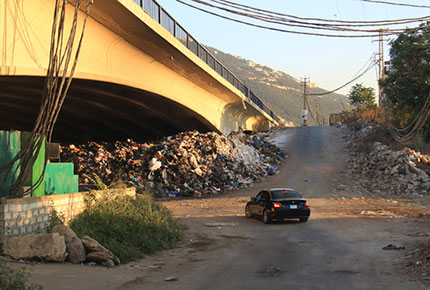An opportunity not to waste
LAU experts discuss the reasons behind the current waste management crisis and shed light on the possible ways to overcome it.

Lebanon’s political deadlock remains the major issue preventing the country from moving toward more effective waste management.
According to the latest estimates in Lebanon, each one of us produces almost one kilogram of waste everyday. The closing of the Naameh landfill in July and the subsequent inability to find a satisfactory alternative have resulted in piles of trash festering in the streets, making the speed of garbage accumulation strikingly evident.
Such a catastrophic environmental situation could constitute an opportunity for Lebanon to finally progress toward a more sustainable solution. Up until now, landfilling — a land-exhaustive waste disposal option — has been the preferred, though often inefficient, technology.
According to Mahmoud Wazne, associate professor at LAU’s Civil Engineering department, this solution is suboptimal for Lebanon. “Landfilling is not the best option for a country that has little spare land and where, on top of that, there is the NIMBY issue,” he says, referring to the acronym for “not in my backyard.”
“It could be a good solution were it to be implemented properly, but in Lebanon this hasn’t been the case,” Wazne continues, remarking that, following the contamination of groundwater in Naameh, other communities oppose the creating of a new dumpsite in their area. Alternatives include incinerators and anaerobic digestion, a technology that breaks down biodegradables to produce biogas — an end material that can be combusted to generate electricity and heat. “These other technologies have little margin of error and have been successfully used everywhere,” he says.
However, Wazne advocates the need for a Life Cycle Assessment (LCA) before any decision is taken. “This analysis would give a true picture of which solution is the best in the Lebanese context,” he argues. While each of the available technologies has its pros and cons, combining this kind of analysis with local factors like distance and cost of transportation would lead to a better understanding of the respective trade-offs.
For all that, Lebanon’s political deadlock remains the major issue preventing the country from moving toward more effective waste management. “How are you going to solve an issue like garbage when politicians disagree on the very method of decision making?” says Marwan Rowayheb, associate professor of social sciences. “This crisis is the outcome of a historical deadlock, the same deadlock that has made it impossible to elect a president, change the electoral law or form a new parliament.”
The issue of waste is now part of a package of requests that civil society is presenting to the government. However, the lucrative economic returns of the business of garbage are paralyzing the situation. “On top of that is regionalism,” says Rowayheb, “as some leaders want to gain popularity by opposing the construction of a dumpsite in a particular area.”
The government now seems to have finally given in to a greater participation of municipalities in waste management. However, as Rowayheb puts it, the devil is in the details. “If we look at the technicalities of it,” he says, “the plan requires a lot of effort from municipalities, and this might give leeway to more corruption.”
Any decision in this regard is ought to be the product of the formation of a political class able to act for the good of the country and to opt for the least harmful short-term solution, until long-term bids are reconsidered. With the rainy season about to hit Lebanon, the failure to disentangle from the political impasse would be tantamount to taking responsibility for an environmental catastrophe.
More
Latest Stories
- Alumnus Rafic Helou Bridges Ambition With Curiosity
- LAU’s Think Tank Addresses Energy Transition
- Dr. Myriam El Khoury-Malhame’s Research Shapes a Resilient Future
- Future Pharmacists Take Their First Step into the Profession
- Breastfeeding Support Room Inaugurated at LAU
- LAU GASC Launches the Advisory Taskforce for Recovery, Reforms, and Development
- Engineers and Researchers Flock to LAU for the Fifth IEEE MENACOMM 2025
- Medical School Faculty Receives a Programme Hubert Curien–CEDRE Grant

